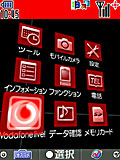 HI Corporation have launched a new 3D menuing system for mobile terminals. The company believes that by presenting menus in 3D, depth of field enhances the users’ visual recognition of icons.
HI Corporation have launched a new 3D menuing system for mobile terminals. The company believes that by presenting menus in 3D, depth of field enhances the users’ visual recognition of icons.
The menu application will be used as an extension to its Mascot Capsule Engine, a 3D engine already adopted by the three major carriers in Japan and licensed around the world to Motorola and Sony Ericsson.
The company’s plans don’t stop there though – it sees potential for the new UI in many other mobile devices with LCDs, such as digital cameras and camcorders.
With applications like Swerve and Mascot reaching phones around the world, I have to ask if advances in menu systems like this actually make using small devices easier, or if it’s just a way of selling new devices to customers. After all, people do have a tendency to judge a device not just on its looks and perceived capabilities, but tend to make a decision on its sophistication based purely on its display UI.
HI Corp
Published by

Fraser Lovatt
Fraser Lovatt has spent the last fifteen years working in publishing, TV and the Internet in various capacities, and believes that they will be seperate platforms for at least a while yet. His main interests at the moment are exploring where Linux is taking home entertainment and how technology is conferring technical skills on more and more people.
Fraser Lovatt was born in the same year that 2001: A Space Odyssey was delighting and confusing people in the cinemas, and developed a lifelong love of technology as soon as he realised that things could be taken apart, sometimes put back together again, but mostly left in bits or made into something the original designer hadn't quite planned upon.
At school he was definitely in the ZX Spectrum/Magpie/BMX camp, rather than the BBC Micro/Blue Peter/well-behaved group. This is all deeply ironic as he later went on to spend nine years working at the BBC.
After a few years of working as a bookseller in Scotland, ("Back when it was actually a skilled profession" he'll tell anyone still listening), he moved to England for reasons he can't quite explain adequately to himself. After a couple of publishing jobs punctuated by sporadic bursts of travelling and photography came the aforementioned nine years at the BBC where he specialised in internet technologies and video.
These days his primary interests are Java, Linux, videogames and pies - and if they're not candidates for convergence, then what is?
View all posts by Fraser Lovatt
 HI Corporation have launched a new 3D menuing system for mobile terminals. The company believes that by presenting menus in 3D, depth of field enhances the users’ visual recognition of icons.
HI Corporation have launched a new 3D menuing system for mobile terminals. The company believes that by presenting menus in 3D, depth of field enhances the users’ visual recognition of icons.